Discover how Google Text-to-Speech enhances audio with lifelike AI voices, multilingual support, and advanced customization features. Read more.

Akshat Mandloi
Updated on
December 26, 2025 at 11:36 AM

AI-powered text-to-speech (TTS) technology is transforming industries at a remarkable pace—powering smart assistants, content creation, and accessibility tools worldwide.
Google Text-to-Speech has been a popular choice for businesses and developers thanks to its accurate, natural-sounding voices and wide language support. But is it the best tool available in 2025?
In this blog, we'll dive into Google TTS's key features, how it works, and why it's so widely used. We'll also compare it with other advanced platforms, like Smallest.ai, Speechify, and Murf AI, to help you find the right TTS solution for your needs.
What is Google Text-to-Speech?
Google Text-to-Speech is a cloud-based API powered by Google’s AI technologies that convert written text into spoken words. Used in applications like Google Assistant, audiobooks, and accessibility tools, it provides businesses and developers with realistic, human-like voice synthesis. With over 380 voices across 50+ languages, it enables businesses to personalize user interactions efficiently.
Now that we have a basic understanding of what Google Text-to-Speech is, let’s look at some of its standout features.
Key Features of Google Text-to-Speech
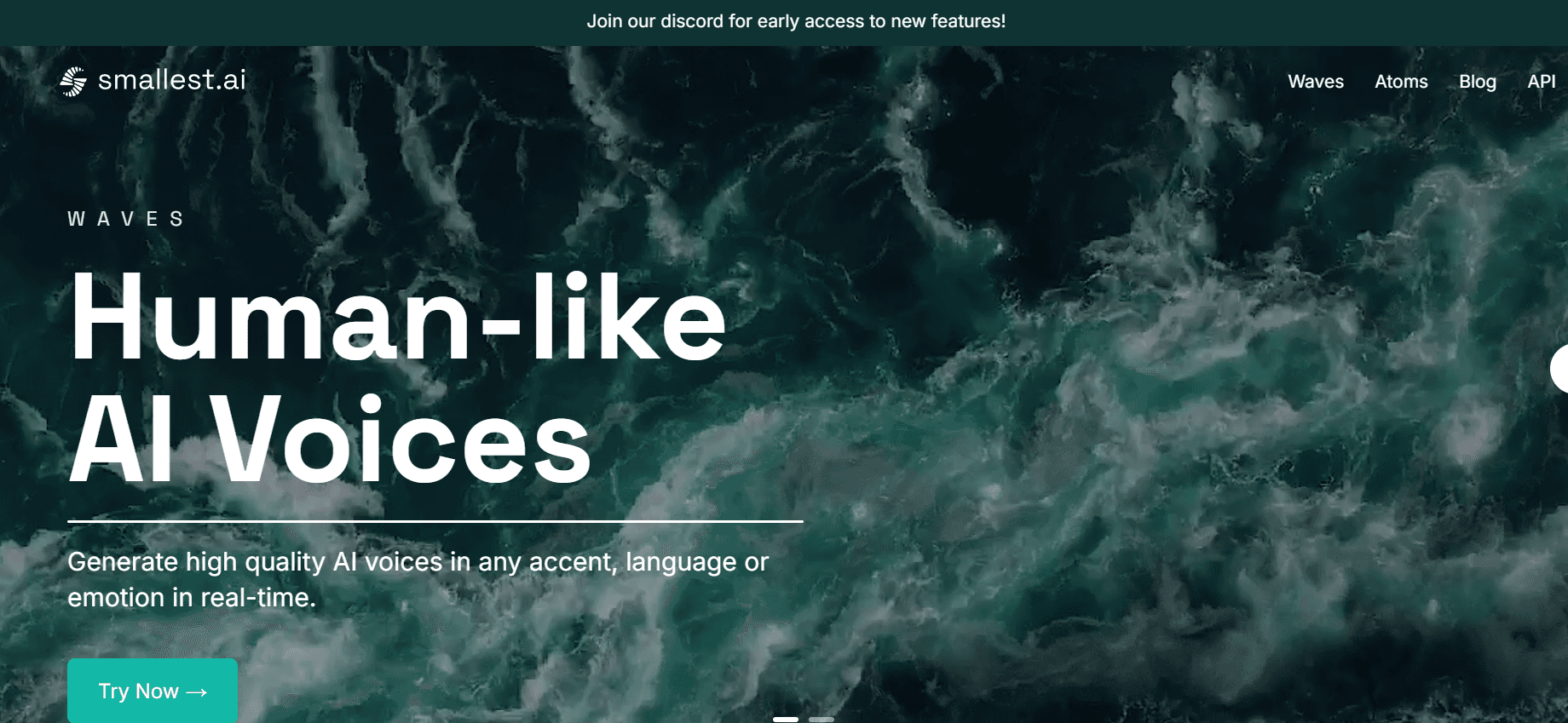
Source: Google Cloud webpage
Google Text-to-Speech offers a range of features designed to enhance audio content creation. Here’s a look at some of the key highlights.
High-Fidelity Speech: It uses DeepMind’s research to generate speech that is near humanlike voices.
Extensive Voice Selection: Choose from over 380+ voices in 50+ languages, including regional variations.
Custom Voice: Train and deploy a unique voice for your brand using your own audio recordings.
Neural2 Voices: Provides more natural and expressive speech for engaging interactions.
SSML Support: Use Speech Synthesis Markup Language (SSML) to add pauses, emphasize words, and adjust pronunciation.
Multiple Audio Formats: Supports MP3, Linear16, OGG Opus, and more.
With these features, Google Text-to-Speech provides an all-in-one solution for businesses seeking customized and engaging voice interactions.
However, If you're looking for an alternative tool with advanced AI voice capabilities, Try Smallest.ai today which is another great option to explore. It offers high-quality voice synthesis with an intuitive interface, making it easy to generate natural-sounding speech. Now that you’re familiar with its key features let’s take a closer look at how Google Text-to-Speech works behind the scenes.
How Does Google Text-to-Speech Work?
Google Text-to-Speech converts written text into natural-sounding speech using advanced AI models. It processes text through neural networks to generate high-quality, humanlike voice output. Here’s a step-by-step breakdown.
Input Processing: The text input is analyzed and converted into a format suitable for speech synthesis.
Neural Network Processing: Advanced AI models, including WaveNet and Neural2, process the text to generate natural-sounding speech.
Speech Synthesis: The processed text is converted into an audio waveform, ensuring realistic pronunciation and intonation.
Output Generation: The final synthesized speech is delivered in the selected language, voice, and format.
With an intuitive API, developers can integrate Google Text-to-Speech into their applications effortlessly. Whether you're building interactive voice assistants or automating content narration, this tool ensures a smooth experience.
Now that we’ve explored how it works let’s uncover the major benefits of using Google Text-to-Speech.
Key Benefits of Google Text-to-Speech
Google Text-to-Speech enhances accessibility, user engagement, and automation with lifelike AI-generated voices. It offers cost-effective, scalable, and multilingual speech synthesis for various applications.
Enhanced User Experience: Provides a more engaging and accessible way to interact with content.
Cost-Effective Solution: Eliminates the need for expensive human voiceovers and recording sessions.
Time Efficiency: Converts text into speech within seconds, saving time on audio production.
Scalability: Can handle large volumes of text-to-speech conversion for businesses of all sizes.
Multi-Language Support: Expands global reach with support for 50+ languages.
If you're looking for an alternative with similar capabilities, Smallest.ai offers innovative text-to-speech solutions with a focus on personalization and affordability. Try it today to experience high-quality AI-generated voices.
Top Use Cases of Google Text-to-Speech
Google Text-to-Speech has numerous applications across different industries. Here are some of the top use cases:
Voice Assistants & Chatbots: Powers virtual assistants like Google Assistant, improving conversational AI.
Audiobooks & Podcasts: Converts books, articles, and blog posts into high-quality audio content.
Customer Support Solutions: Enables AI-driven call centers to deliver natural-sounding responses.
E-learning & Accessibility: Assists visually impaired users with text-to-speech conversion in educational content.
Multilingual Translation & Narration: Facilitates language learning and localization.
To further enhance your AI voice strategy, explore Smallest.ai, which offers easy-to-integrate AI-powered voice solutions tailored for various industries. Now that we know the use cases let’s compare Google Text-to-Speech with other popular text-to-speech tools.
Top Alternatives to Google Text-to-Speech In 2025
While Google Text-to-Speech is a powerful solution, it’s always good to explore alternatives. Here are some popular competitors.
1. Smallest.ai

Source: Smallest.ai Website
Smallest.ai offers an ultra-fast, high-quality text-to-speech (TTS) solution powered by its Lightning model—the world’s fastest TTS engine with sub-100ms latency. It delivers natural, lifelike voices in real-time, making it a perfect fit for content creators, businesses, and developers alike.
Why Choose Smallest.ai?
Lightning-Fast Processing: Real-time API processes speech in under 100ms.
High-Fidelity Voices: AI-generated speech with natural intonation and emotion.
Instant Voice Cloning: Create quality clones with just 10 seconds of recorded speech.
Multilingual Support: 100+ voices with 30+ language capabilities.
Scalable API: Handles over 1M requests per minute with Python SDK support.
Affordable Plans: Flexible pricing for individuals, startups, and enterprises.
Best for: Businesses enhancing IVR systems, content creators needing high-quality voiceovers, and developers integrating AI-driven speech into applications.
Pricing:
Free ($0/month): 30 mins TTS, API access.
Basic ($5/month): 3 hours TTS, 1 instant voice clone.
Premium ($29/month): 24 hours TTS, 2 instant clones, 1 professional voice clone.
2. Speechify
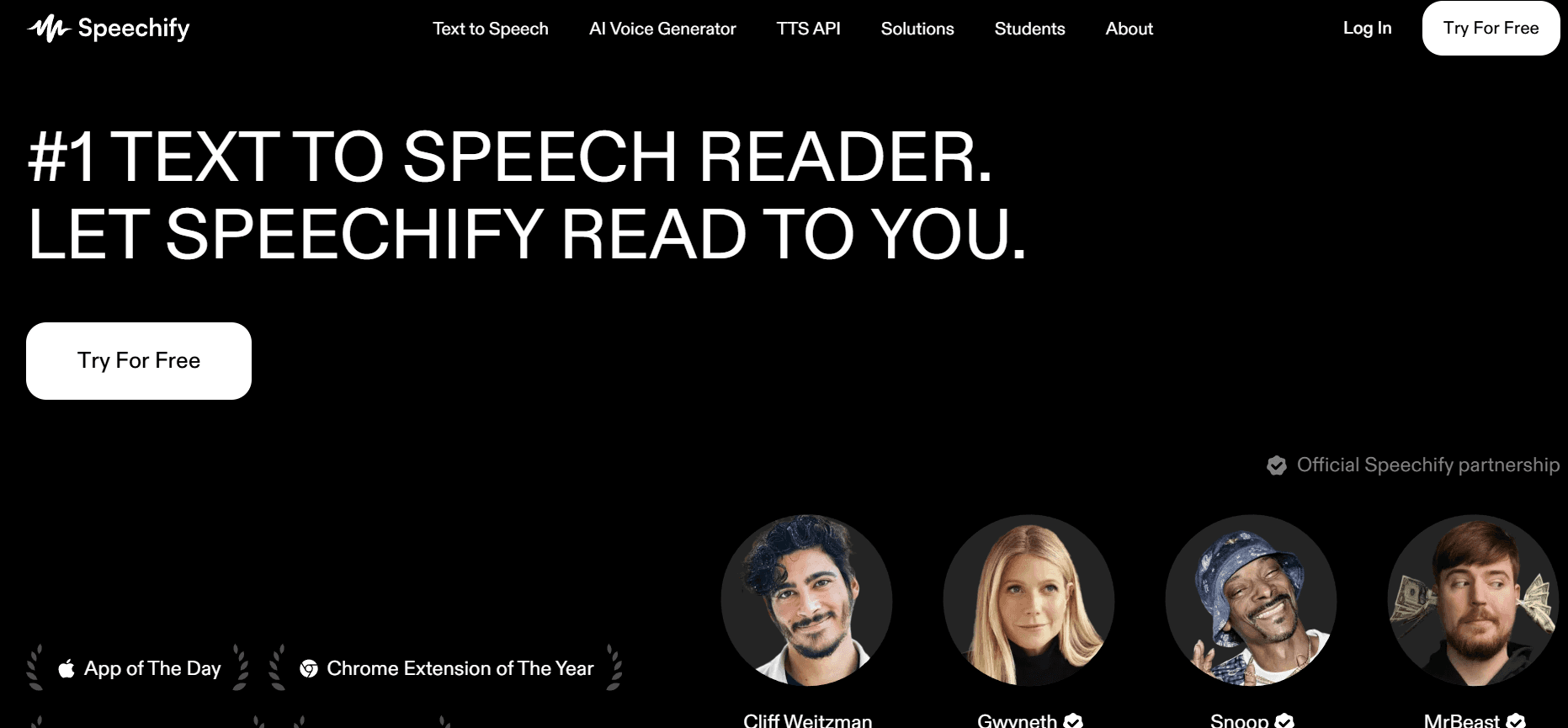
Source: Speechify website
Speechify is a TTS platform that converts text into audio, ideal for students, professionals, and individuals with reading difficulties. It transforms articles, PDFs, and documents into speech for seamless listening.
Key Features:
Cross-Platform Accessibility: Works on mobile, desktop, and browsers.
OCR Support: Converts scanned books and handwritten notes into speech.
Adjustable Playback Speed: Up to 9x speed for efficient listening.
Natural AI Voices: Offers celebrity voices and multiple accents.
Third-Party Integration: Connects with Google Docs, Dropbox, and more.
Best for: Students, professionals, and individuals with dyslexia or vision impairments.
Pricing:
Free ($0/month): 10 standard voices, 1x speed.
Premium ($29/month): 200+ voices, 60+ languages, 5x speed, OCR scanning.
Audiobooks ($9.99/month): Access to 60,000+ titles with 12 annual credits.
Speechify is an excellent tool for accessibility, learning, and productivity, making reading effortless and convenient.
3. Lovo.ai
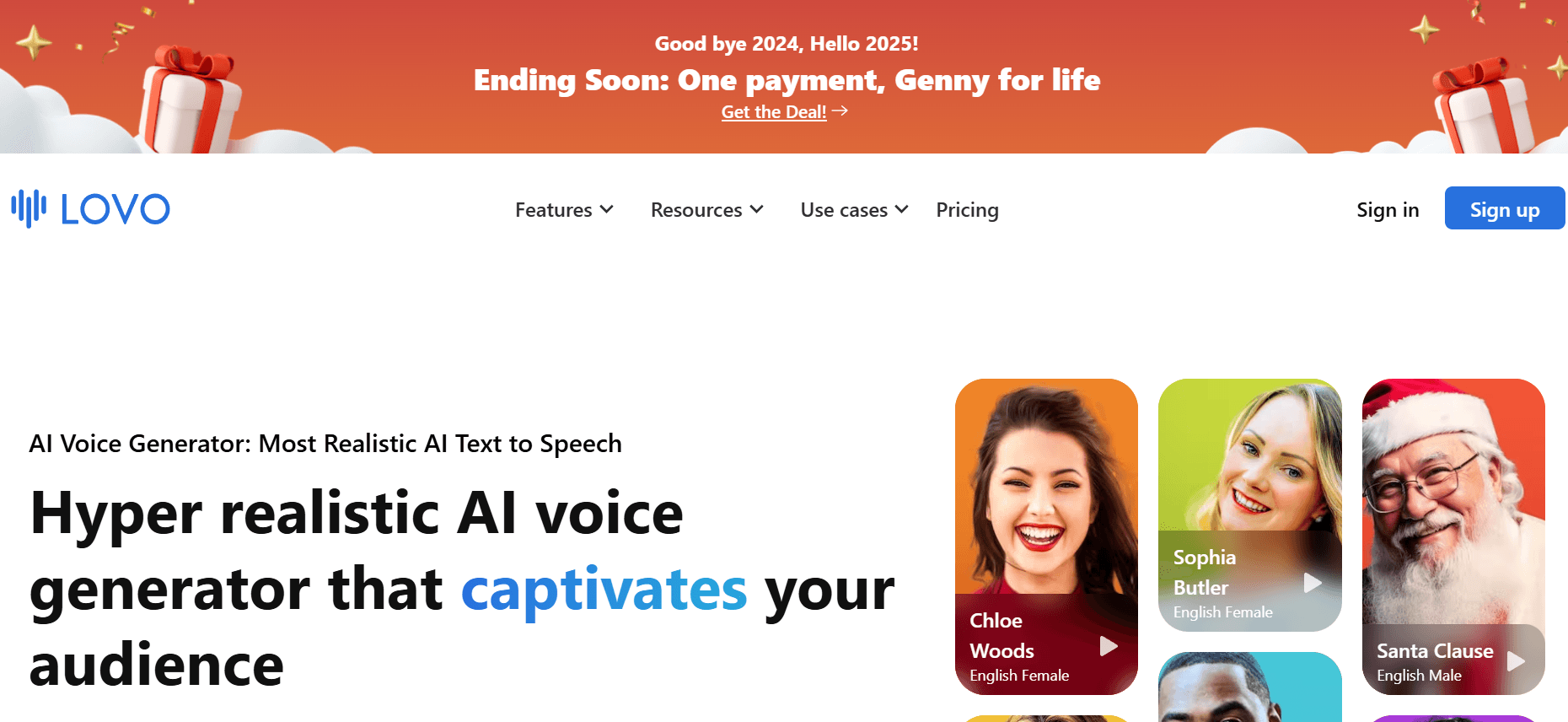
Source: LOVO Ai Website
Lovo.ai is an AI-powered text-to-speech (TTS) platform tailored for creators needing expressive, character-driven voices. Ideal for gaming, storytelling, audiobooks, and animations, it brings emotional depth to AI-generated speech.
Key Features:
Emotionally Expressive Voices: 180+ AI voices with tones like happiness, sadness, anger, and excitement.
Real-Time Customization: Adjust tone, pitch, and pace for different moods.
Genny AI Voice Generator: Creates natural, adaptive speech patterns for dialogue and ads.
Built-in Sound Effects & Music: Streamlines audio production for marketing and entertainment.
Best for: Game developers, storytellers, audiobook creators, and marketers seeking impactful, character-driven voiceovers.
Pricing:
Basic ($29/month): 2 hours of voice generation, 5 voice clones, subtitles, HD export.
Pro ($48/month): 5 hours, multilingual voices, unlimited cloning, AI creation tools.
Pro+ ($149/month): 20 hours, 400GB storage, priority support.
4. Play.ht
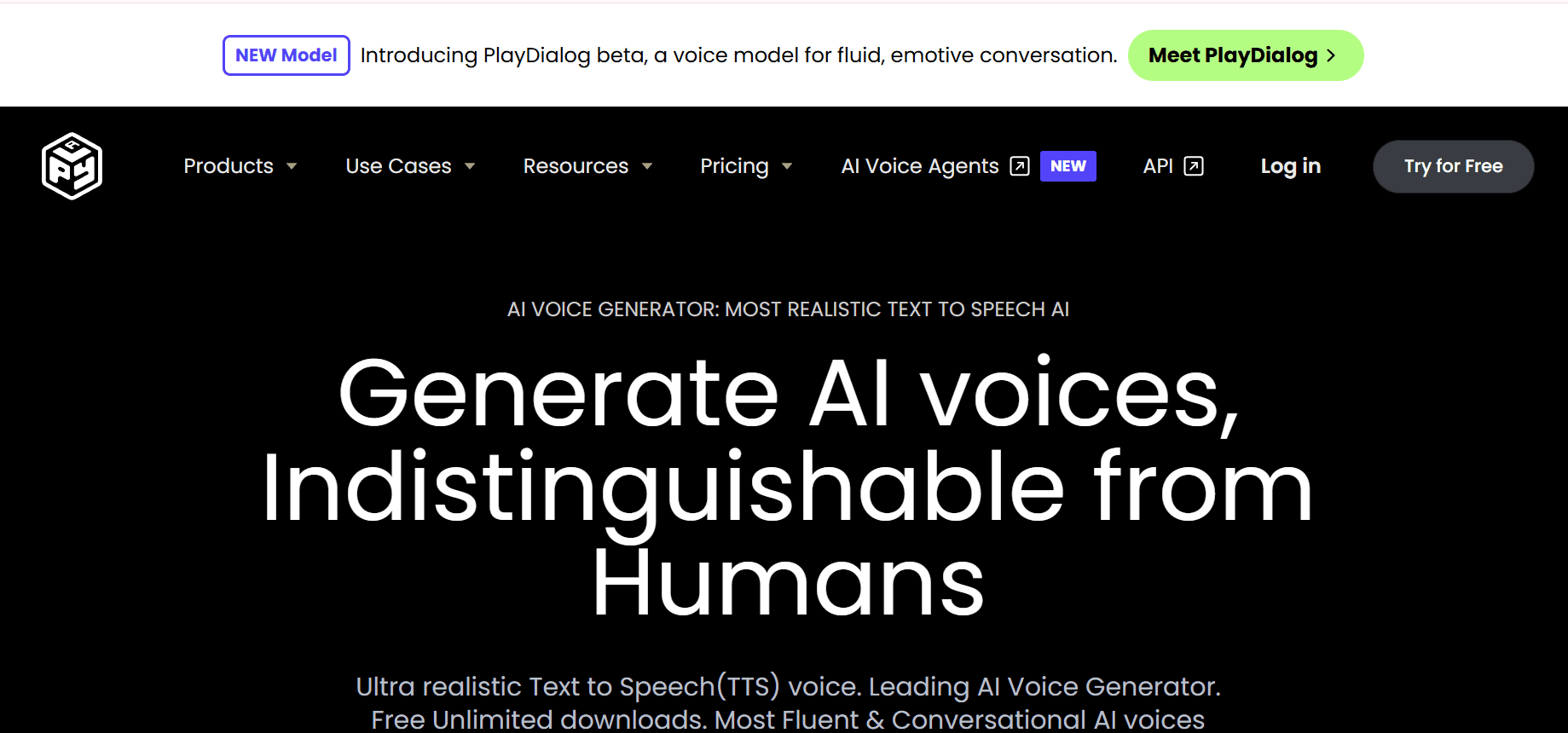
Source: Play.ht Website
Play.ht is a powerful AI voice platform designed for businesses, creators, and developers who need highly customizable text-to-speech (TTS). With a vast AI voice library and advanced controls, it’s perfect for professional voiceovers, podcasts, and narration.
Key Features:
800+ AI Voices in 100+ Languages: Ideal for multilingual projects.
SSML Support: Fine-tune tone, emphasis, and pauses for natural speech.
Downloadable Voiceovers: Export in MP3/WAV for easy integration.
Cloud-Based Generation: Instant previews and fast audio processing.
Best for: Content creators, businesses, podcasters, and audiobook producers needing advanced speech customization.
Pricing:
Free ($0/month): 12,500 characters, 1 instant voice clone, API access.
Creator ($19/month): 250,000 characters, 10 voice clones, full voice library.
Unlimited ($99/month): Unlimited characters and voice clones, commercial use.
Enterprise (Custom): Advanced security, team access, and re-sell rights.
5. Murf AI
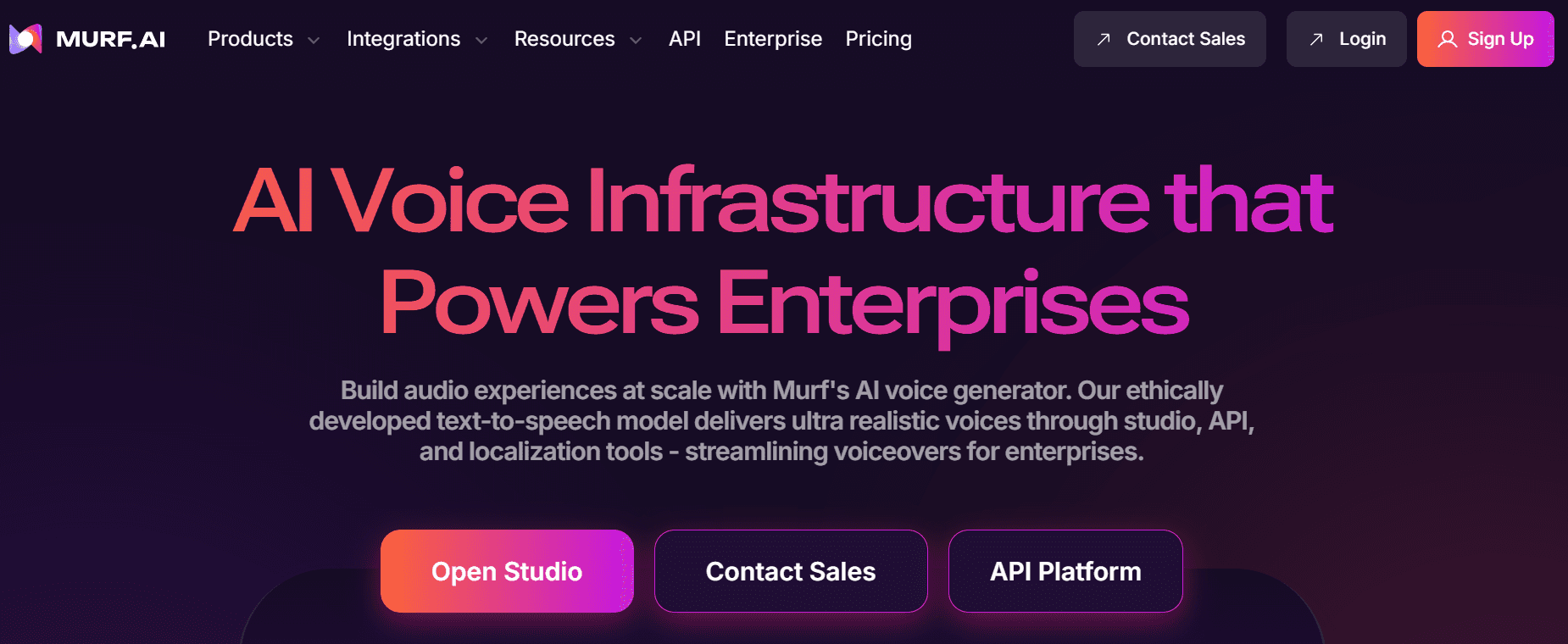
Murf AI is a leading text-to-speech platform that provides high-quality, lifelike voiceovers with advanced customization options. It allows users to fine-tune elements like pitch, speed, emphasis, and pronunciation, making it an excellent choice for content creators, educators, and businesses.
Key Features:
Realistic AI Voices: Delivers natural-sounding voices with expressive intonation and clarity.
Diverse Voice Library: Offers 120+ male and female AI voices across 20+ languages, catering to various tones and styles.
Easy-to-Use Interface: A drag-and-drop editor enables seamless voiceover creation, even for beginners.
Full Customization Control: Adjust pitch, speed, volume, and pronunciation for a tailored audio experience.
Flexible Pricing: Includes a free trial and multiple plans to fit different needs.
Best for:
Ideal for businesses, content creators, podcasters, and educators seeking professional-grade voiceovers with customization.
Pricing:
Business Plan ($29/month): Access to premium voices and features.
Enterprise Plan (Starts at $99/month): Customizable solutions for large-scale needs.
Murf AI stands out for its user-friendly interface and robust customization, making it a top choice for high-quality AI voice generation. Each tool has its strengths; choosing the right one depends on your specific needs, whether it's content creation, business automation, or interactive voice applications.
Conclusion
AI-powered text-to-speech technology is transforming business communication—making interactions more engaging, accessible, and efficient. Google Text-to-Speech is one of the most widely recognized tools in this space, offering natural-sounding voices, multilingual support, and scalable performance for industries like customer service, e-learning, and content creation.
However, for businesses looking for even greater flexibility and real-time processing, Smallest.ai presents a powerful alternative. Its Lightning TTS model boasts sub-100ms latency, instant voice cloning, and support for 30+ languages—making it a game-changer for content creators, developers, and global enterprises alike.
Whether you're building interactive voice assistants, generating audiobooks, or enhancing e-learning modules, AI-driven TTS platforms offer the customization and performance needed to engage audiences effectively.
Ready to experience next-level AI speech synthesis? Try Smallest.ai today and transform your text into lifelike, high-quality audio within seconds!

Automate your Contact Centers with Us
Experience fast latency, strong security, and unlimited speech generation.
Automate Now

